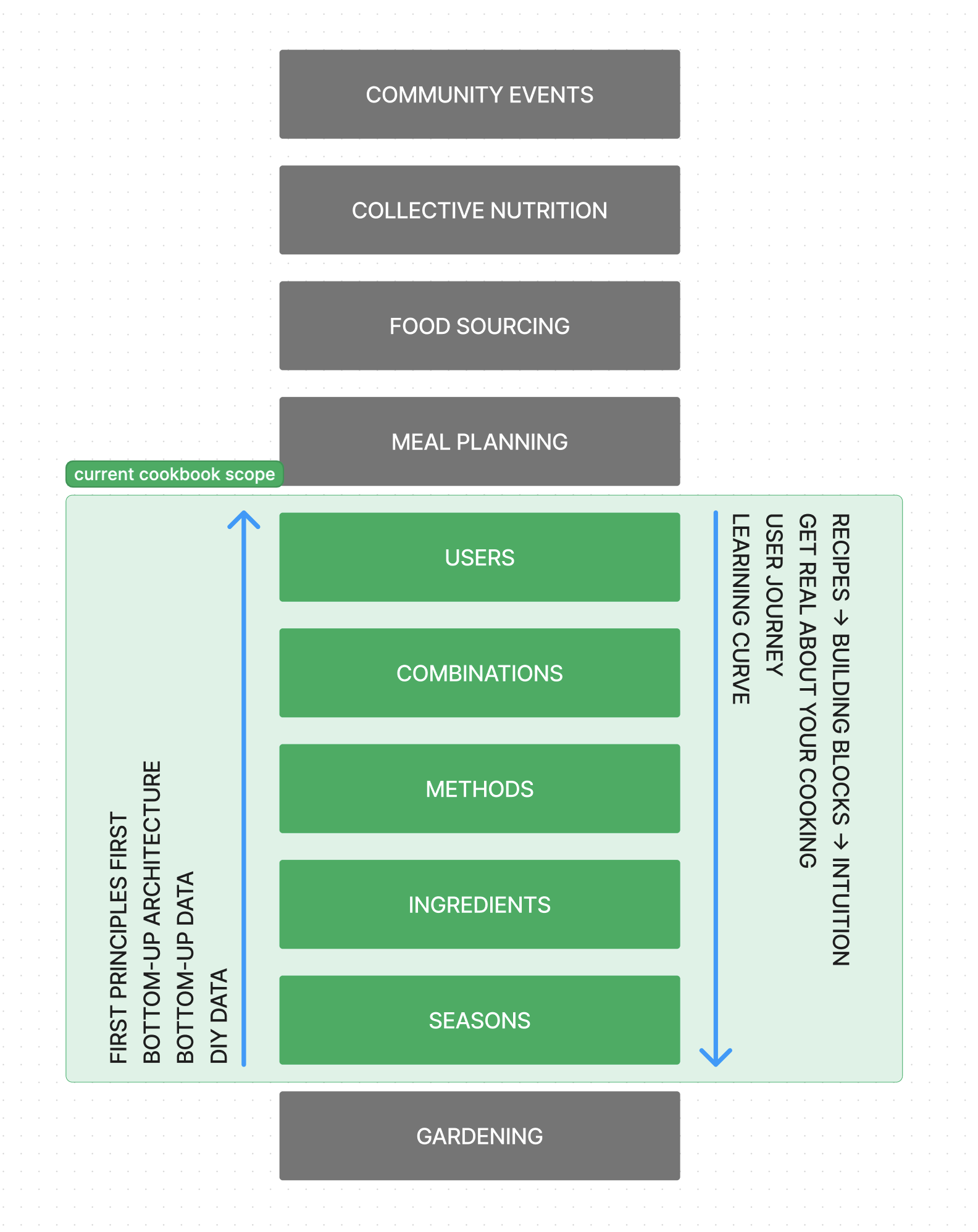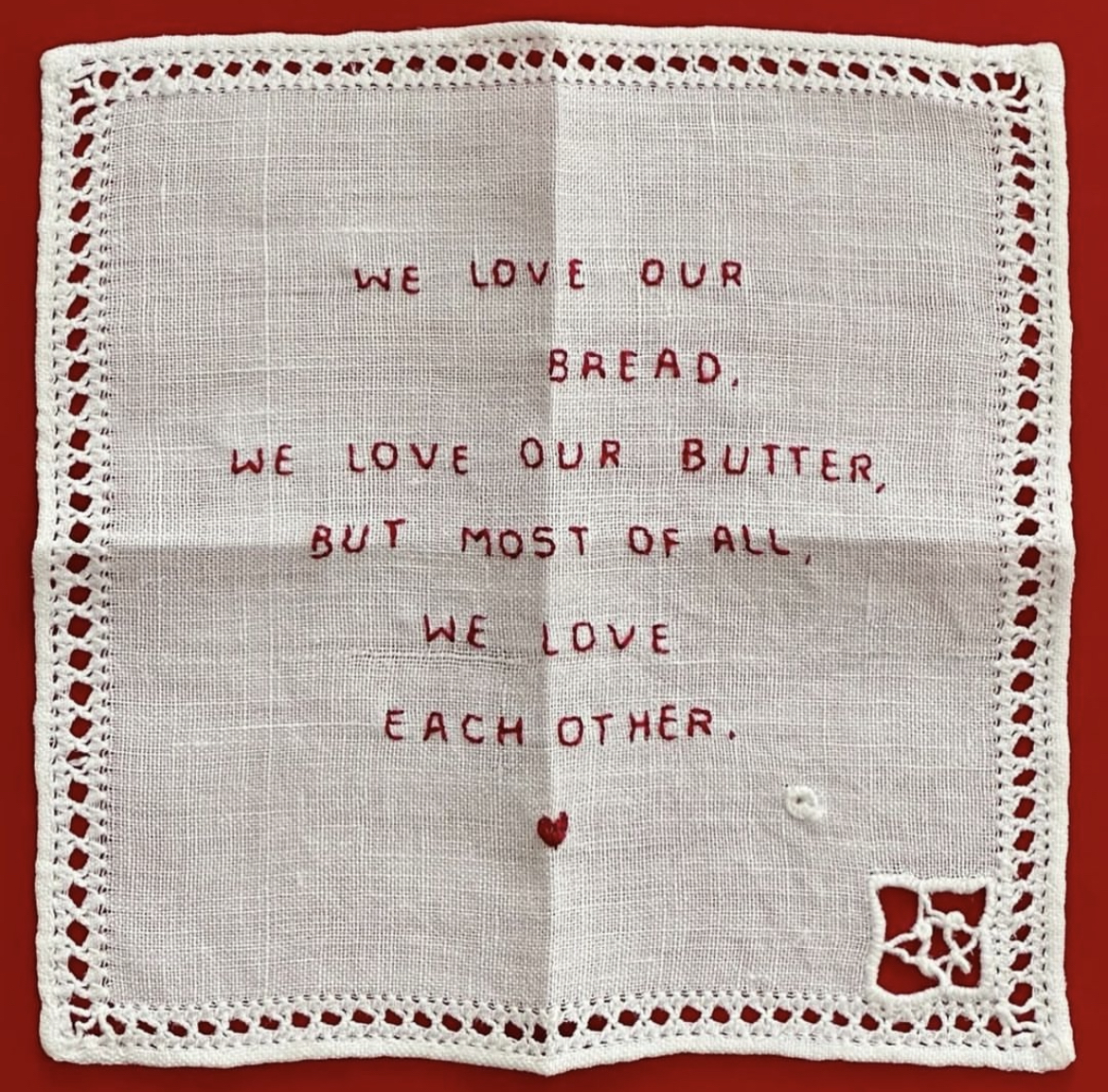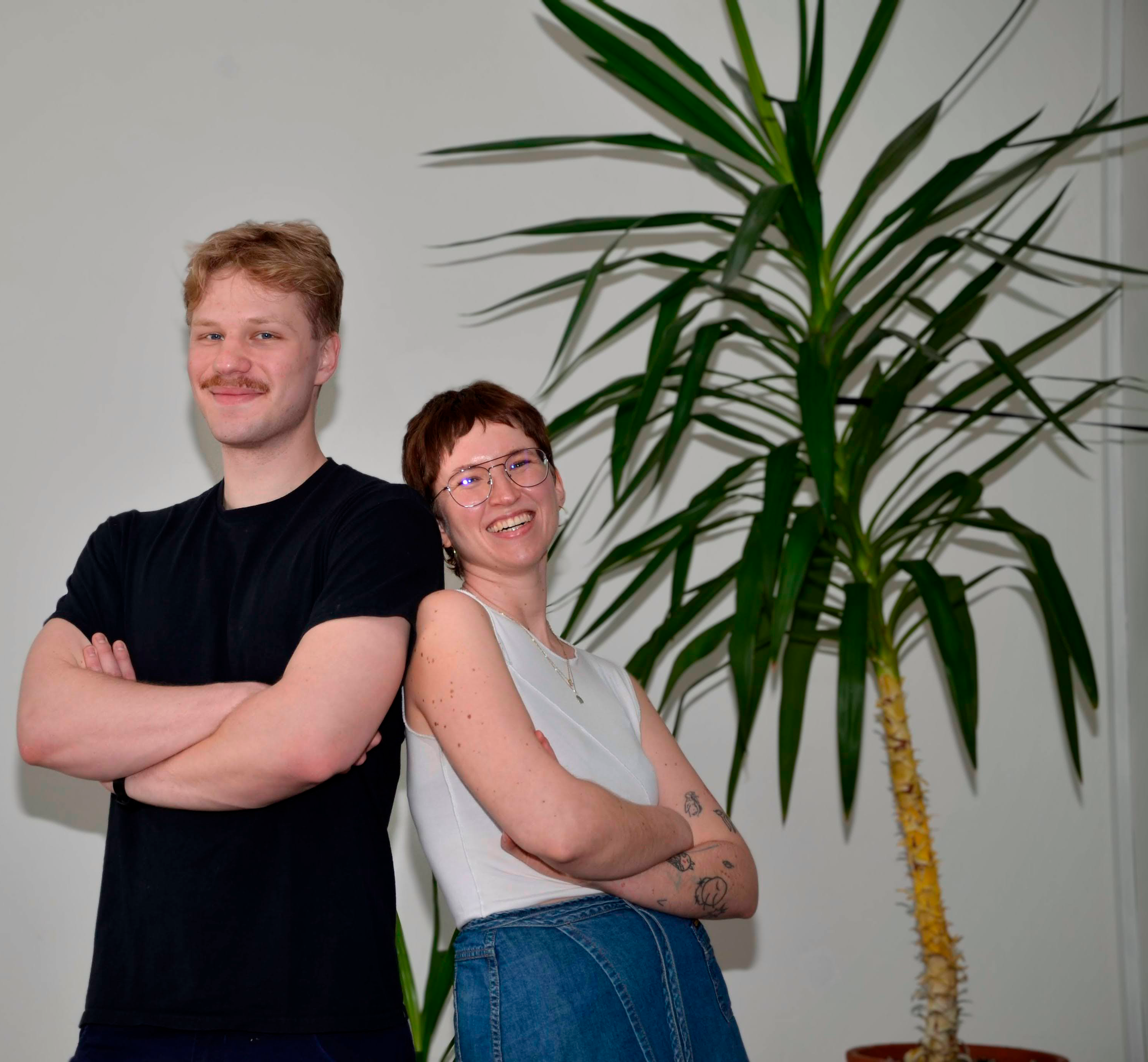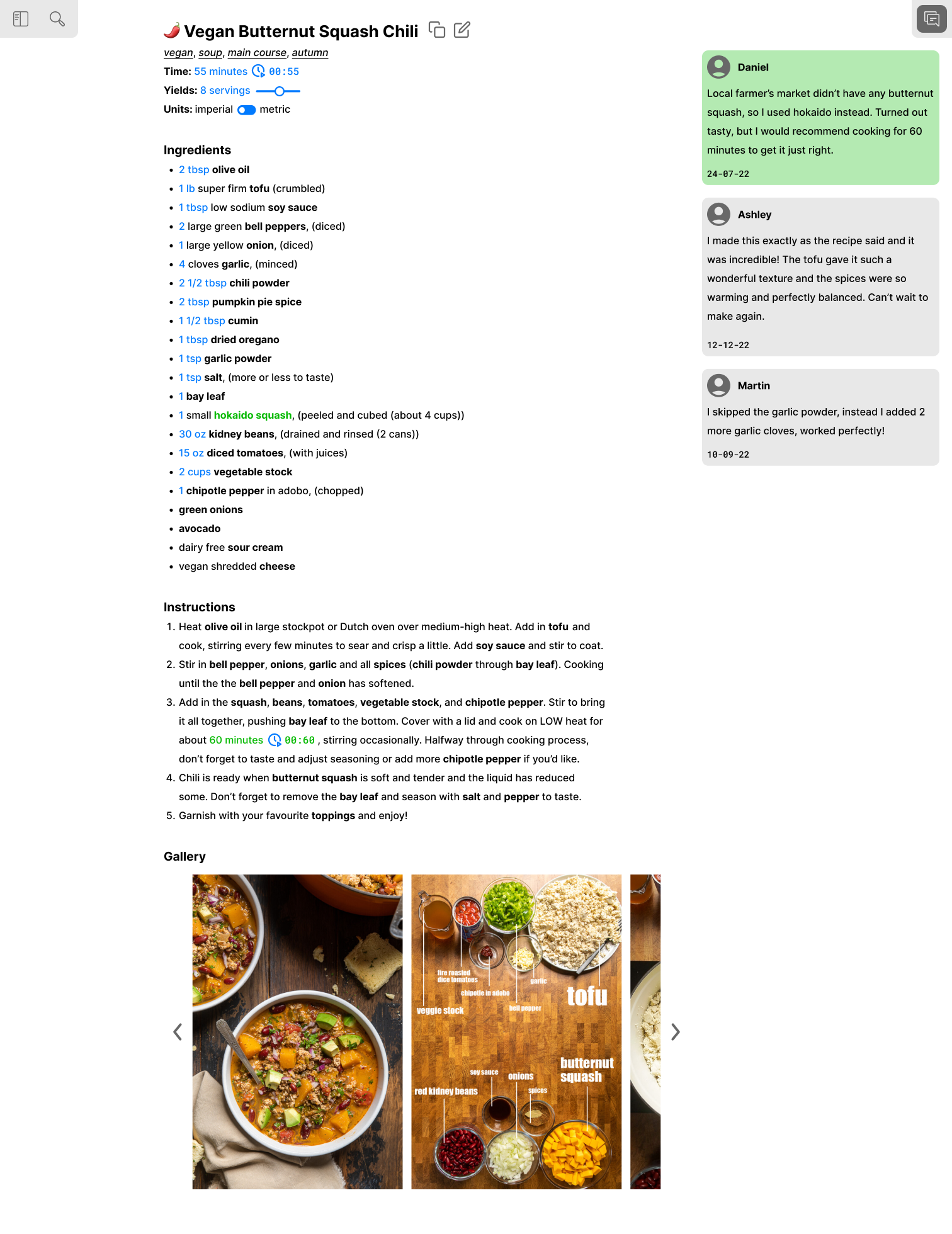🥕 cookbook.care
cookbook.care is a collaboration between Daniel Gális and Julie Dudová based around sharing and caring while also being a FaVU school project.
a truly safe space should allow and nurture existence outside of the social roles people normally occupy in their families and workplaces
Our main goal is spreading the idea of sustainable eating (environmentally, economically and spiritually). c.c encourages inspiration by season and place while questioning the role recipes, focusing instead on building intuition using first principles.
There is nothing better than eating delicious food, but for most people eating is just a way to nourish the body, to have energy to work and to live to an old age. Mothers often tell their children to eat their food even if they do not like the taste—because it is "good" for them.
But nutrition cannot be separated from the sense of taste. Nutritious foods, good for the human body, whet the appetite and are delicious on their own account. Proper nourishment is inseparable from good flavor.
In the 2023 winter semester, we designed an app to help us cook more, use more local and seasonal ingredient and (re)learn first the principles of taste, heat, texture, and so on.

The open-source app is based on a connections dialogue between Julie, who has been cooking without recipes for years, and Daniel, a beginner cook who appreciates the structure of a recipe.
Throughout the semester, we have been meeting weekly to discuss our experiences with the app, our thoughts on cooking and eating, and our ideas for the future of the project.
While the app remaines in closed beta, we have slowly been moving away from recipes, both practically and with our theory of cooking.
In the 2024 summer semester, we are working on a publication that will document our process and ideas, and we are planning to release the app to the public in the near future.
The following is a synthesis of our individually written reflections about the state of the project, our goals, and our (research) questions for the future of cookbook.care.
synthesis
I love cookbook.care.
...I love the content we talked about in the last session
I am starting to conceptualise c.c. as an in-between space, an intersection, but one that makes sense of the whole…
finding the connections between design and food - the preparation, the ritual, the preservation.
finding a balance between the internal needs of the soul and the external demands of the outside world. A balance between hunger and craving, time capacity and season, the need for self-expression and the obligation to hand in a schoolwork.
btw I quite enjoy how open we are to each other, unafraid of communicating if we don't have time or feel that a session is not needed right now. it helps me to not feel forced into creating content “on commission”.
I want this project to evolve according to our real needs, whether they're physical, mental, individual or collective.
i don't expect any fluctuations I guess. work and school are consistent throughout the semester.
I hope that in the future, c.c. will become a platform for sharing texts and ideas related to sustainability (in life and design), care and perception of experience (individual and collective). I want our process itself to be sustainable (recognising possible developments in context of how much time and resources we want to devote to it)
i want to create
…modify the app to serve my real needs better
gradually work on a manifesto [no rush we have forever] - I would like to write it together, maybe during one long session. I think it is important to share a text describing the core of c.c. regarding how dialogue-oriented the project is.
i want to learn
how to work with information and pass it on in a viable way knowing how to embrace a large project and structure it clearly being able to decide what is necessary a bit more political radicalism
Cooking is political. It always has been and it always will be. It is a method of education and a catalyst for community engagement. It can simultaneously be a voice of dissent and a tool of extreme oppression. In its purest form, cooking is an act of love.
to embrace consistent blogging about the soft poetic aspects as well as the technological research being done, but most importantly - be real and honest, creating a dialogue
(but I don't see any of this as something that has to happen)
What we are doing and thinking about is simultaneously hyper-personal and hyper-universal.
i feel like a lot of people don't like to eat/prepare food at home because it looks ugly and it's not "fun". i believe the only food styling you need is a basic colour scheme. like if you get a chopped-up radish, red tomatoes in season, fresh cucumber and good bread with some butter, you just have to like it, right? and you don't need basil gel and papaya shavings. right now, the “main” thing is finding a shareable outcome (for this semester)
c.c. is by us, for us, but also potentially for everyone, by everyone
questions
Why is this project important to you? When you ignore the team (Daniel + Julie), what do you, personally want to experience, discover, and create? What is worth our energy? How much do you want to put in? What metrics can be used to gauge one’s energy? What feasible outcomes are there? What are their pros and cons?
The essential function of a recipe is documenting an experience for oneself and others, thus preserving and accumulating knowledge. But following exact recipes also limits the development of one’s intuition and sharpening of one's senses, instead trusting the opinion of an “expert” in order to achieve a certain reproducible, “branded” meal. Following instructions can feel like a game, but it also feels restraining and creates unnecessary expectations. Similar to society's roles, a recipe is something you have to fit into. How can we redesign recipes so that they still preserve knowledge, but don't perpetuate the toxic nature of exactness?
We agreed to make c.c. as open-source as possible - no author’s license. Is it possible to achieve this without hurting the ego?
In the recent interview with Bublinka we mentioned our aversion to creating another “recipe” instead of redesigning recipes. Can we avoid the “how to” paradigm? Is sharing and offering your point of view without a specific guide the only way, or can we find a middle ground?
In my opinion, the AIs of today (LLMs, LIMs…) are better described as “very limited artificial intuition” rather than “artificial intelligence”. Everything they produce is made up on the spot, referencing training data in a hazy rather than exact way. Can we leverage computer intuition in building our intuition?
Is there something c.c. related that you would like to read, but it doesn't exist (yet)?

...there's no such thing as caring too much

